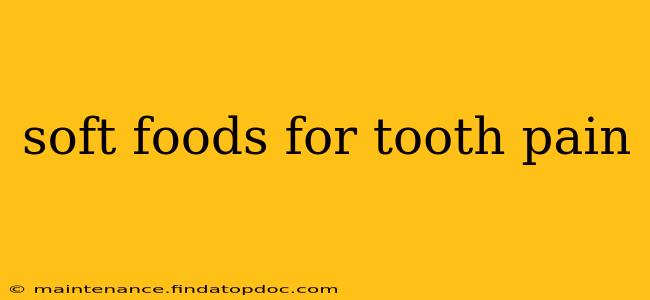Dealing with tooth pain is incredibly uncomfortable, making even the simplest act of eating a challenge. Chewing can exacerbate the pain, leading many to seek out soft foods that are gentle on sensitive teeth and gums. This guide explores a variety of soft food options that can provide nourishment and comfort while you recover from dental procedures or manage existing tooth pain.
What are the best soft foods to eat when you have a toothache?
The ideal soft food for tooth pain should be easily chewed, require minimal jaw movement, and be free from ingredients that might irritate the affected area. Avoid anything crunchy, hard, or excessively acidic. Think creamy, smooth, and soothing. Good choices include:
- Soups: Broths, pureed soups, and cream-based soups are excellent options. Choose soups that are low in acidity to avoid further irritating sensitive teeth.
- Yogurt: Plain or flavored yogurt offers a good source of protein and calcium, essential for oral health. Look for varieties that aren't overly acidic.
- Applesauce: Unsweetened applesauce provides a smooth, easily digestible texture that won't put pressure on sore teeth.
- Mashed potatoes: A classic comfort food, mashed potatoes are easy to swallow and provide carbohydrates for energy.
- Oatmeal: Cooked oatmeal, especially when blended with milk or broth for a smoother consistency, can be a soothing and nutritious option.
- Scrambled eggs: Softly scrambled eggs are a good source of protein.
- Smoothies: Blend fruits, vegetables, yogurt, and protein powder for a nutritious and customizable meal replacement. Avoid adding ice, which can be too hard on sensitive teeth.
- Pureed vegetables: Pureed carrots, sweet potatoes, or other soft vegetables can provide essential nutrients.
What should I avoid eating with a toothache?
While focusing on soft foods, it's equally important to know what to avoid to prevent further irritation and discomfort. Stay away from:
- Hard foods: Anything that requires significant chewing, such as nuts, chips, hard candies, and raw vegetables.
- Sticky foods: Foods like caramel, toffee, and gummy candies can cling to teeth and exacerbate pain.
- Acidic foods: Citrus fruits, tomatoes, and acidic beverages can irritate sensitive teeth and gums.
- Extremely hot or cold foods: Temperature extremes can aggravate tooth pain.
What foods are good for healing after a tooth extraction?
After a tooth extraction, it's crucial to follow your dentist's instructions carefully. Generally, soft foods are recommended to allow the extraction site to heal properly. Focus on foods that require minimal chewing and won't dislodge the blood clot forming in the socket. Examples include:
- Smoothies: A great way to get nutrients without straining your jaw.
- Yogurt: A good source of protein and probiotics, which can support gut health.
- Pudding: Provides a creamy, easy-to-eat option.
- Ice cream (in moderation): The coldness can help numb the area, but avoid extremely cold temperatures.
Are there any specific nutrients I should focus on when eating soft foods for tooth pain?
While enjoying soft foods, prioritize nutrient-rich options to support overall health and oral recovery. Calcium and vitamin D are crucial for strong teeth and bones. Protein aids in tissue repair, and antioxidants can help reduce inflammation. Consult with a dentist or nutritionist for personalized dietary advice.
Can I eat solid foods if I have mild tooth pain?
If your tooth pain is mild, you might be able to tolerate some softer solid foods. However, always prioritize comfort. If chewing causes pain, stick to softer options. If the pain persists or worsens, consult a dentist immediately.
This information is for general guidance only and does not constitute medical advice. Always consult with a dental professional for diagnosis and treatment of tooth pain. They can provide personalized recommendations based on your specific condition and needs.
